If you’re reading this, you might be running a course on Teachable or doing your research before you sign up. You want to make sure that your business is set up for expansion.
⚠️ Many course creators quickly outgrow Teachable and other online course platforms. They realize they want more marketing and customization options – something that Teachable can’t offer.
Unfortunately, these creators aren’t able to take their course to the next level using Teachable. They often have the same issues with other “hosted course platforms” like Kajabi, Mighty Networks, and Podia because of the nature of these tools.
The solution that course creators turn to is setting up a self-hosted WordPress website with an LMS plugin. However, migrating to this setup can be complicated and costly.
Also, when you leave Teachable you leave your content behind, and any payment plans will need to remain on Teachable under they are wrapped up.
Therefore, it is recommended that you think carefully before choosing Teachable, so you understand its exact capabilities.
If you plan on growing and scaling your online course business, you’re better off choosing a self-hosted solution from the beginning.
On the other hand, if you plan for your course to stay as a side project, then a hosted platform like Teachable would be a good option.
Take a look at the decision tree below to help you better understand what platform you should choose, based on your needs.
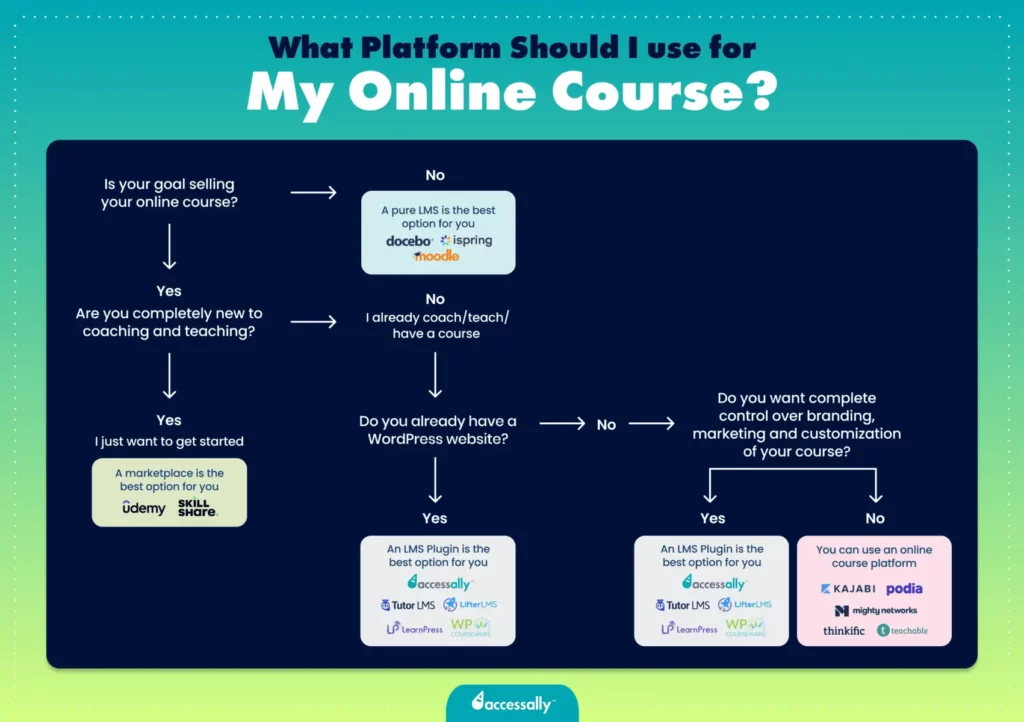

Why should I consider alternatives to Teachable?
Many course creators who want to scale their business realize that they’ve outgrown Teachable and that it isn’t meeting their needs. If that’s you, you might have run into some of the main issues that make people explore other course options.
The primary reasons people leave Teachable for a self-hosted LMS plugin are:
- Not open source: Since Teachable is a platform-as-a-service tool, the code is not open source and it cannot be extended or altered. Along those lines, if you cancel your account, your content will be lost, as well as access to your customer list. On the contrary, if you are hosting your courses or membership program on a platform like WordPress, you own your content and have access to the source code. Leaving Teachable for an LMS plugin means full control over your business.
- Lack of integrations with other systems: Because Teachable prioritizes an all-in-one system philosophy, it has a limited focus on integrating other systems. That means you’re depending on a single tech system, which poses a risk during outages or downtime. It also limits your ability to pass data between systems and automate marketing activities.
- Zero customization: Often creators seek a Teachable replacement due to its recognized limitations. A closed and hosted platform, like Teachable, restricts users to predefined functionality or awaiting new features to be developed. These limitations impact revenue generation, course management, and membership handling. Similarly, design options are limited within Teachable’s hosted framework, which restricts customization for those who want a unique brand identity.
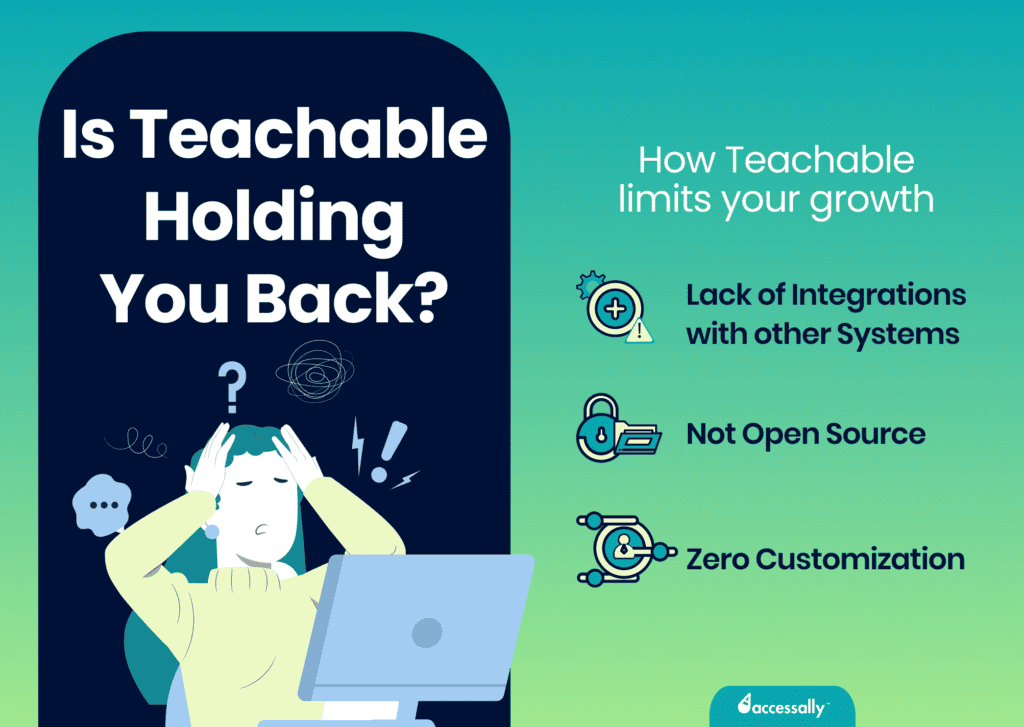

Alternatives to Teachable for Growing Online Courses
Teachable is a great option for course creators who don’t plan on growing their business beyond a simple course or two. But those who want to expand quickly find it limiting.
Usually, people leave Teachable when they outgrow it and when they start feeling restricted in their ability to fully customize their courses.
It’s also common for course creators to leave Teachable when they decide to bring their online courses and community together all in one place.
✅ None of the standalone course platforms offer that, so creators end up switching to a self-hosted WordPress LMS plugin instead. This allows them to take full control of their courses, and essentially build their own custom course platform.
The WordPress LMS plugin solution also gives course creators the ability to house everything under one roof on their own website.
This section will present the 6 most popular LMS plugins that make excellent alternatives to Teachable.
1. AccessAlly
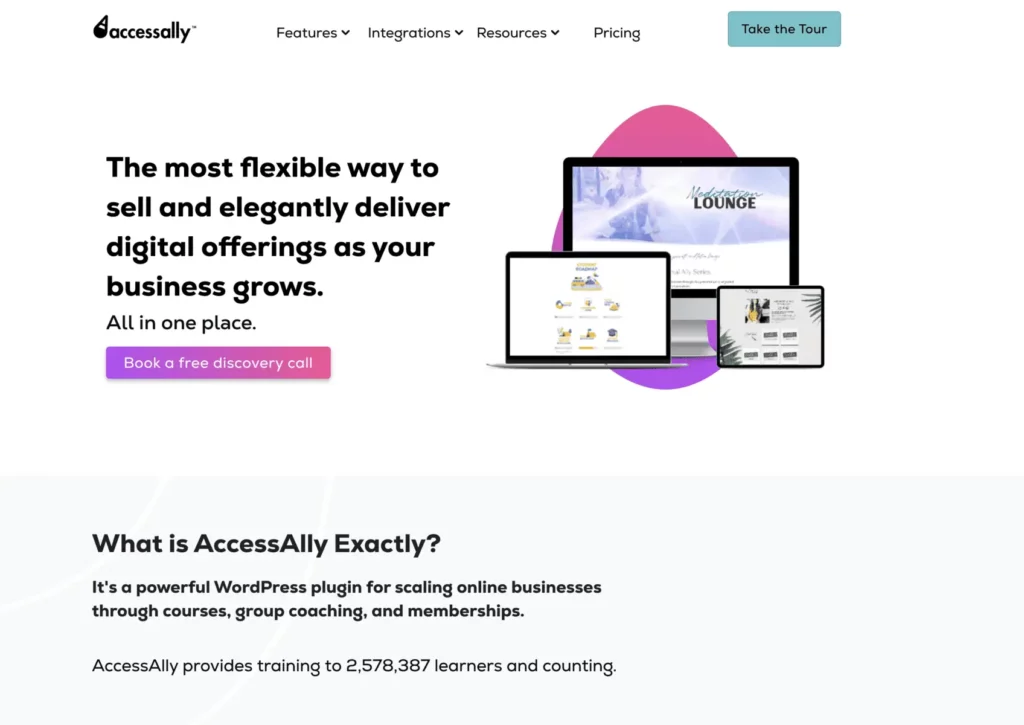

What is AccessAlly?
You can think of AccessAlly as an “out of the box” version of other LMS plugins, because it has everything you need without requiring a lot of add-ons or other plugins.
AccessAlly is one of the most modern LMS plugins on the market, and it provides the full benefits of a learning management system in one place.
Other LMS plugins may require you to purchase additional plugins and add-ons from other companies, which isn’t good because it can cause compatibility issues and even make a course site crash.
AccessAlly offers excellent customer support in case course creators need some help along the way. Since there are no third-party add-ons, everything is directly addressed by AccessAlly’s support team and you can get a quick resolution.
AccessAlly provides a smooth and seamless experience for both course creators and for their students and offers a built-in community option.
It’s a plugin that is modern and includes advanced features for long-term business growth. It’s also easy to use and comes with a low risk of tech issues.
Who Should Use It
AccessAlly is the right option for those who want a straightforward solution for scaling their course or membership business, without the hassle of dealing with tech issues or multiple add-ons.
Pros & cons
- Full control over course delivery
- Advanced customization options
- Seamless integration with WordPress
- All-in-one platform for course creation
- Support memberships and member directories
- Scalable with no per-student cost
- Community engagement features (CommunityAlly)
- No add-ons required
- Top-notch customer support
- Steep learning curve for beginners
- Initial setup takes time
Price
AccessAlly offers three straightforward subscription-based plans with a 60-day no-risk money-back guarantee. The Essentials plan starts at $82 per month if billed annually.
Reviews
Capterra Rating: 4.5/5
G2 Rating: 4.8/5
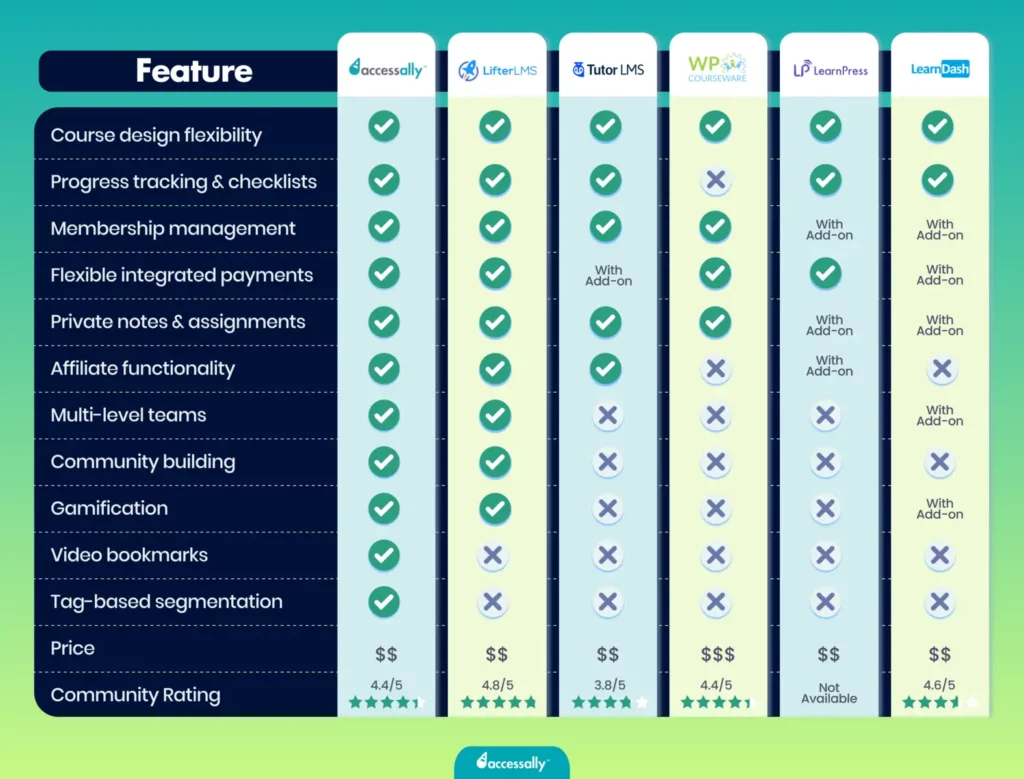

2. LearnDash
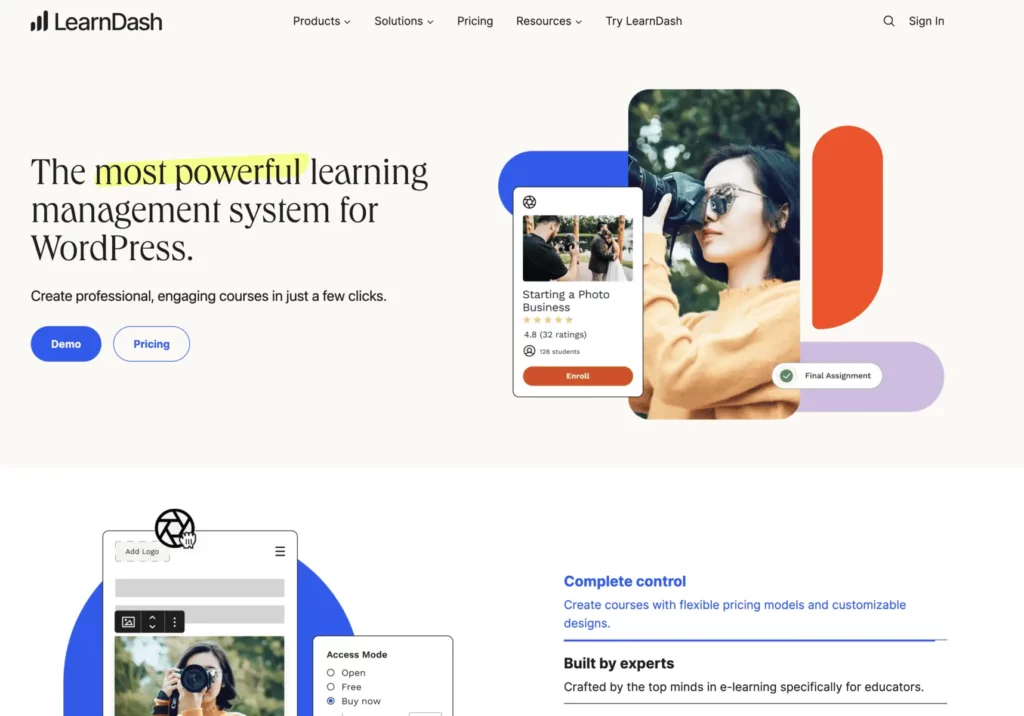

What Is LearnDash?
LearnDash is a popular option among course creators who want to self-host their courses on their WordPress websites. It is used by a wide range of course creators.
Unfortunately, LearnDash is not the most user-friendly when you account for all use cases, and has an outdated interface.
It also required its users to install add-ons and additional plugins to achieve the full functionality of a learning management system. Some of these add-ons are created by third parties and aren’t kept up to date.
Stacking many different add-ons can lead to compatibility issues, site crashes, and downtime for students.
Who Should Use It
While LearnDash is a popular WordPress LMS plugin, we don’t recommend it because there are better alternatives out there. Other options like AccessAlly give you all of the modern user-friendly flexibility you need, without requiring a lot of add-ons that require duct-taping with different plugins.
Pros & Cons
- User-friendly and intuitive interface
- Easy to use for beginners
- Lightweight and robust LMS plugin for WordPress
- A seamless end-user experience in online learning
- Drag-and-drop course builder
- Interactive features like advanced quizzes and assignment management
- Some features are very complex
- The feature suite can be overwhelming for small creators
- Must install additional plugins for more customization
Price
LearnDash offers subscription plans starting at $199 USD per year for one site.
Reviews
Capterra Rating: 4.6/5
G2 Rating: 4.3/5
3. Lifter LMS
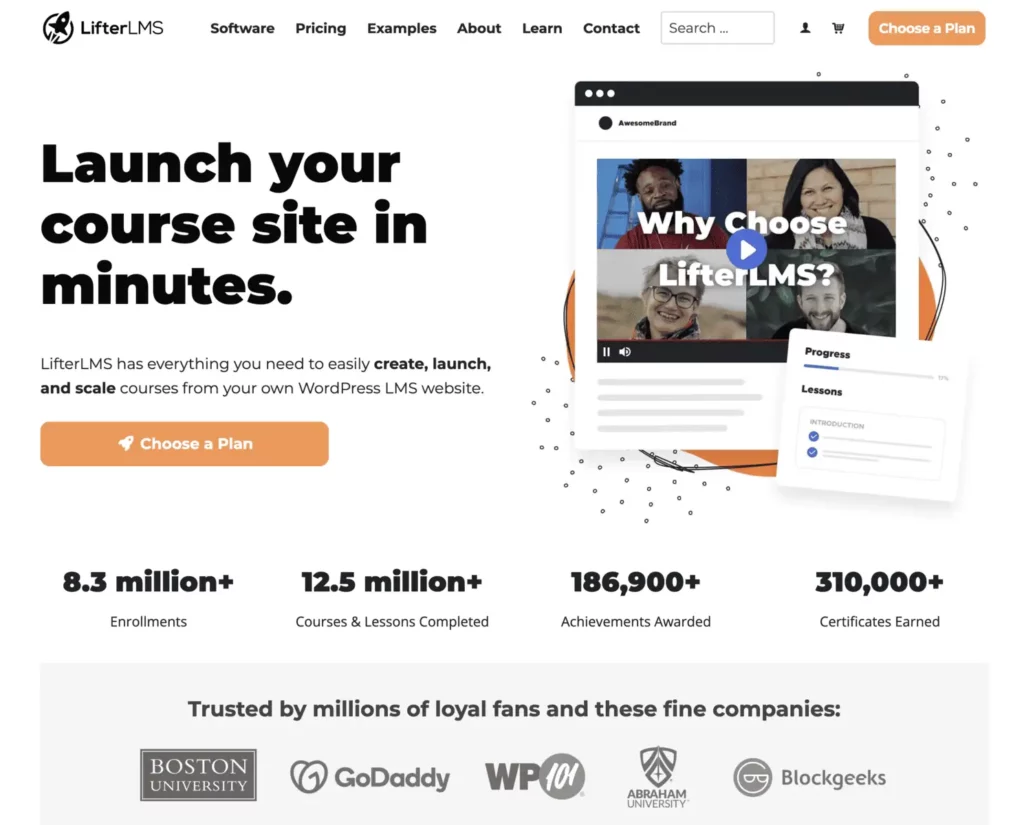

What Is LifterLMS?
LifterLMS offers a lot of functionality, but it isn’t the best choice for course creators who want a seamless learning experience. Like LearnDash, LifterLMS requires additional add-ons and third party plugins to reach the full potential most course creators require.
That being said, LifterLMS tends to be a better choice than LearnDash, when it comes to how many add-ons are required for a full learning management system. You would still need to install some of the basic add-ons, like payment integration with Stripe and PayPal, or a Kit and opt-in form extension.
With LifterLMS, as with LearnDash, you’re opting for a plugin that depends on other tools which means you might have compatibility issues that could crash your site.
Who Should Use It
LifterLMS might be a decent option if you’re looking to scale your online course business by creating your own website. AccessAlly is still a more modern and seamless option than LifterLMS, and comes in at a similar price point when you look at the functionality offered.
Pros & Cons
- The core LMS plugin is free
- It works well with any WordPress theme
- It comes with SkyPilot – a WordPress theme designed for e-learning experiences
- Transparent subscription-based pricing without hidden fees
- 30-day money-back guarantee
- Core differences between subscription plans may be confusing
- It may be complex to use for non-techie creators
- No community engagement features
- Most integrations are only available on the more expensive plans
Price
LifterLMS plans start at $199 USD per year, but there’s a freemium plan.
Reviews
Capterra Rating: 4.8/5
G2 Rating: 4.9/5
4. LearnPress
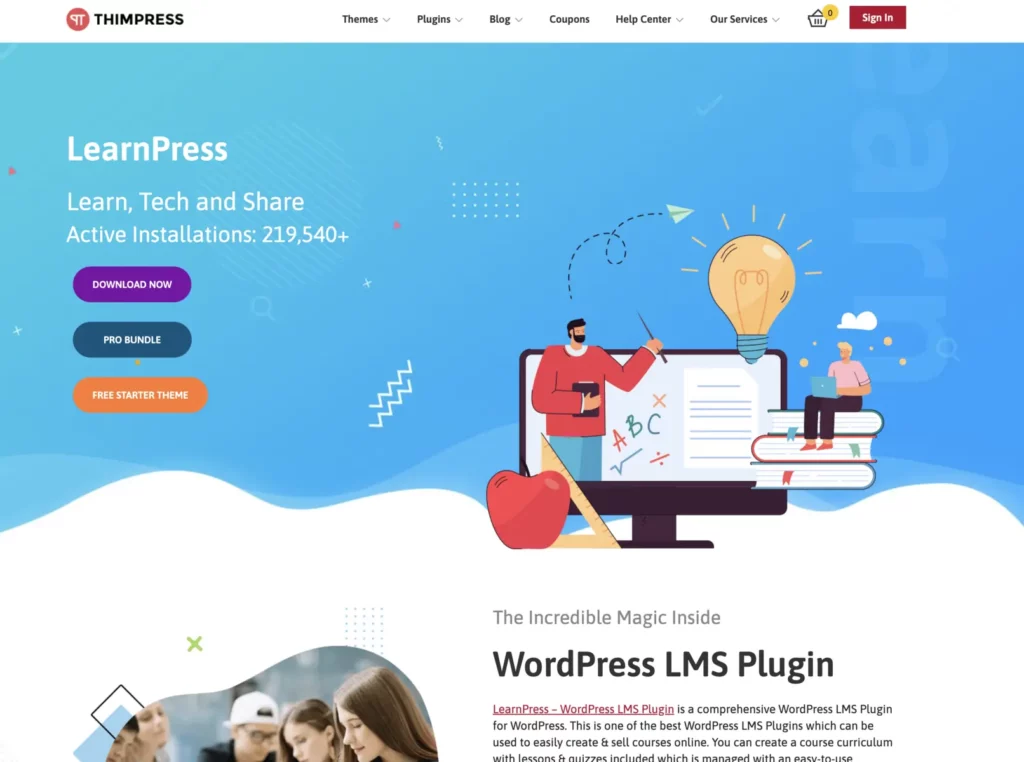

What Is LearnPress?
LearnPress is a free WordPress LMS plugin that has been around for over 10 years, and that makes it a popular choice for course creators. But just because it’s been around for a long time, doesn’t mean that it’s the best choice for your business.
One issue with LearnPress is that it suffers from an outdated user interface, and it hasn’t kept up with the times. That means it only offers the most basic functionality and therefore requires a whole lot of add-ons and other plugins to create a full learning experience.
On top of that, because the core plugin is free, the company isn’t able to offer good customer service. So when you experience an issue with your site, even if you’re a paying customer, you’ll have to wait a long time to get help from the LearnPress team.
Who Should Use It
We recommend you steer clear of the LearnPress plugin because it has too many issues for course creators who want a stable platform that will scale with them.
Pros & Cons
- The core plugin is completely free
- Integrates well with all WordPress themes
- No need to integrate with WooCommerce, unlike other free LMS plugins
- It comes with its native WordPress theme
- Outdated and slow user interface
- Lacks some core functionalities
- Poor user experience, with frequent bugs
- Terrible customer support
- It’s free, but you must pay for add-ons
Price
LearnPress bundle with 28 add-ons costs $299 as a one-time payment. It also has a completely free starter theme.
Reviews
Capterra Rating: Not available
G2 Rating: Not available
5. WP Courseware
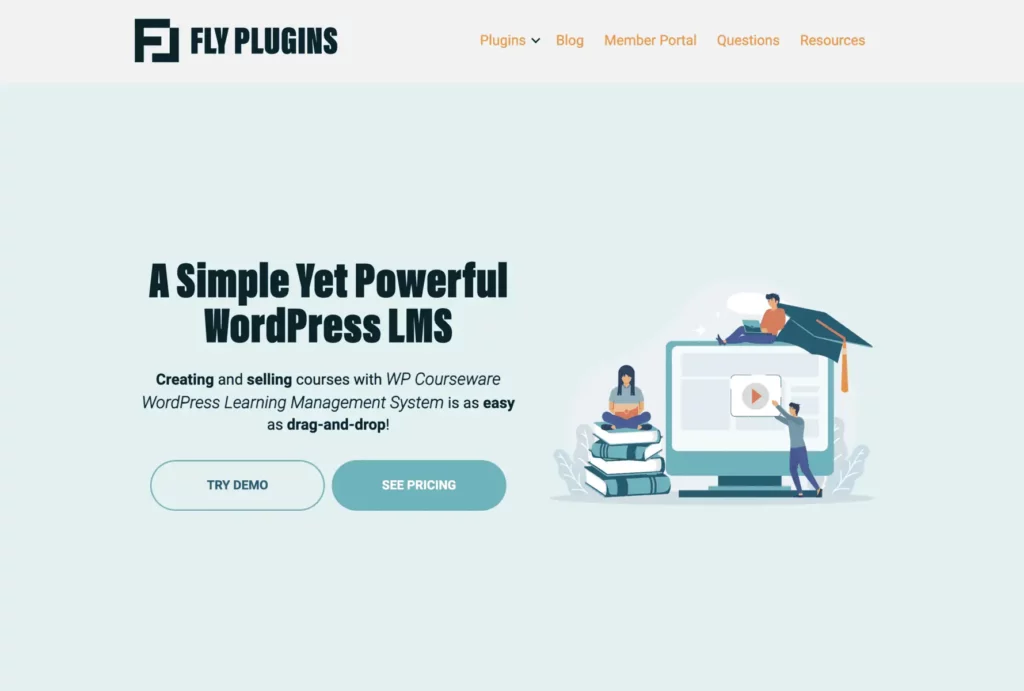

What Is WP Courseware?
WP Courseware is an established WordPress LMS plugin, but it doesn’t come with any membership management features. That means you would need to pair it with something like MemberPress or Wishlist Member in order to handle member access and permissions.
WP Courseware might be comparable to LearnDash in terms of functionality, however it is more basic. That means you would need many other add-ons and WordPress plugins to reach a fully functioning learning environment.
Plus WP Courseware’s backend interface is less than intuitive, and hard to deal with. When you look at everything together, it becomes obvious that WP Courseware combined with MemberPress and other plugins is a weaker version of AccessAlly. It also creates the potential for plugins not to talk to each other properly and leads to issues when plugins become out of date.
Who Should Use It
We don’t feel good recommending WP Courseware to course creators. That being said, you might be able to get away using WP Courseware and MemberPress for basic course hosting. But you might run into tech issues on your site in the long term.
Pros & Cons
- Cost-effective compared to other LMS plugins
- Integrates directly with WooCommerce
- Payment processing features integrated into the plugin
- 30-day risk-free guarantee
- Outdated and slow user interface
- Poor user experience
- Frequent site bugs
- Lacks built-in membership features
- Non-responsive customer support
Price
WP Courseware subscription plans start at $159 per year for a two-site license.
Reviews
Capterra Rating: 4.4/5
G2 Rating: 3.3/5
6. Tutor LMS
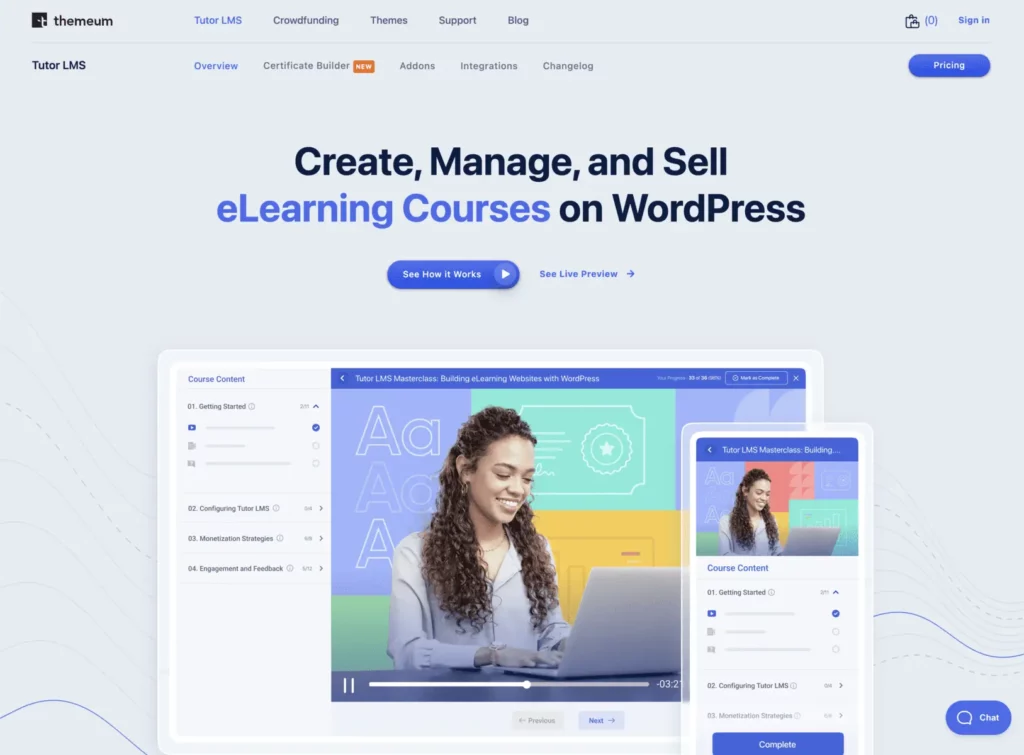

What Is Tutor LMS?
When it comes down to it, Tutor LMS falls into the same category as LearnPress and WP Courseware because it’s clunky and outdated. It requires many add-ons and other plugins to unlock the expected functionality of a learning management system.
That means you’ll often be dealing with a duct-taped series of plugins that might stop working when there’s an update or one of the older ones doesn’t keep up. That could cause site crashes or downtime for your students.
Tutor LMS does offer a free core plugin, but because of this customer support suffers. With the potential for bugs and site issues, you don’t want to deal with poor customer support, either.
Who Should Use It
It’s hard to recommend Tutor LMS because of all the required add-ons, clunky interface, and limited customization. So we don’t recommend it, even if it does offer a free option, because it’s not worth the risk of having your site on the fritz.
Pros & Cons
- The core plugin is completely free
- Cost-effective subscription plans
- Supports all WordPress themes
- Quick setup process
- Easy to use
- Outdated and clunky user interface
- Can interfere with your site’s functionality
- Terrible customer support
Price
Tutor LMS’s subscription plans start at $199 per year for a one-site license. The core LMS plugin is free.
Reviews
Capterra Rating: 3.8/5
G2 Rating: 4.5/5



